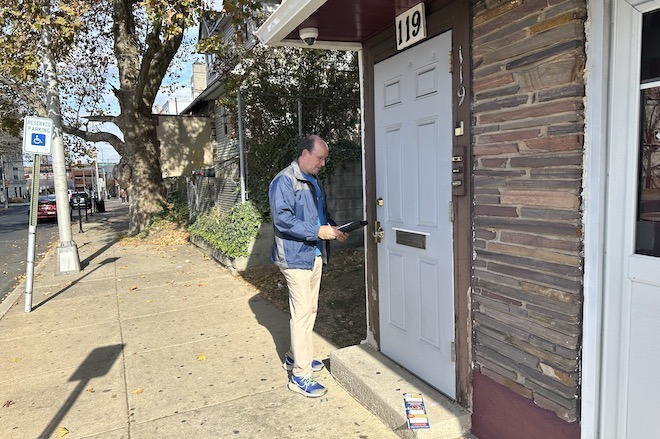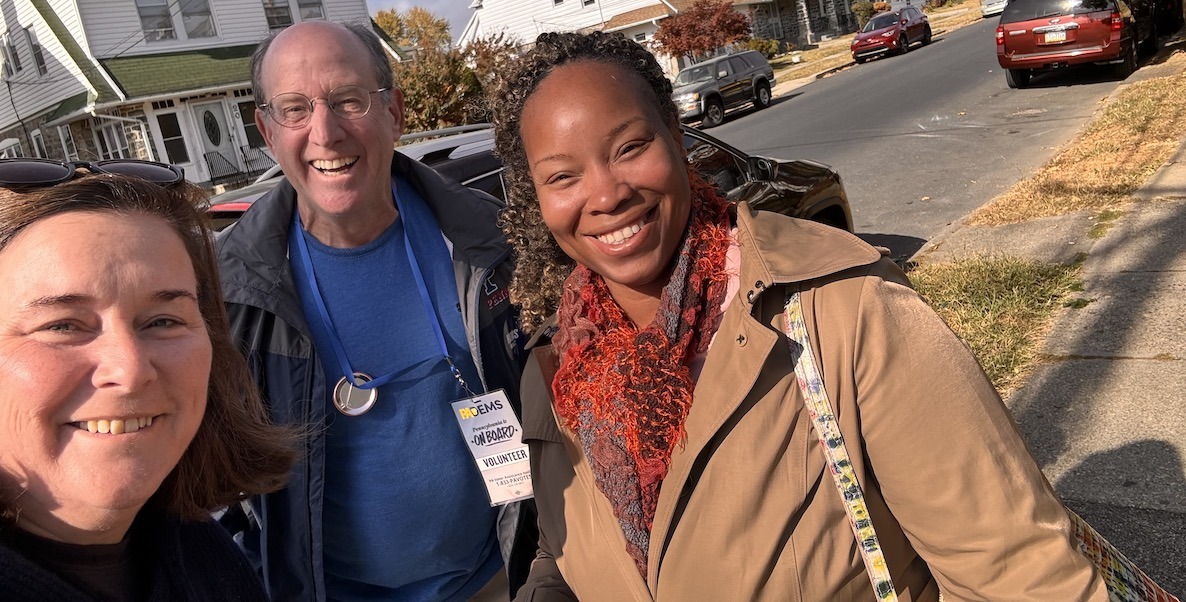When Philadelphia real estate developer Ken Weinstein knocked on the door of an Upper Darby house the morning of November 4, he encountered a mother and daughter who had already — dutifully and excitedly — voted by mail in this year’s presidential election.
Only what they didn’t realize until Weinstein reached them: Their ballots had been rejected.
Their names were on a list, published by Delaware County’s Bureau of Elections, of residents who had turned in ballots with errors. Weinstein explained to them that their votes could still be counted — if they went to their polling location on Election Day and cast provisional ballots. He helped them make a plan so that they could be there to vote.
“When they found out that they could simply vote with a provisional ballot on Election Day, they jumped at that chance,” Weinstein says.
Mistakes are an all-too-common part of PA’s cumbersome mail-in ballot process. Voters need to seal the ballot in a special yellow secrecy envelope and put that envelope inside it a special mailing envelope. Then, they need to sign and date the mailing envelope in the right spot (there are two potential signature spots) before mailing it or placing it in a dropbox. The process is … a lot.
Especially when hundreds of Philadelphia voters received faulty secrecy envelopes this year. More than 3,000 Philadelphians sent in ballots that either had errors or were undeliverable this year. (Undeliverable ballots can occur when people move from one place to another and so don’t receive their mail-in ballot. If you didn’t receive your ballot, you can go to your polling place tomorrow and cast a provisional ballot.)
Weinstein is one of many volunteers statewide who are taking the lists of rejected mail-in ballots and contacting voters to help remedy the issue. The initiative, run by PA Dems, is designed to help Pennsylvanians make sure their votes count. They’re contacting any voter with issues — whether they’re registered as Democratic, Republican or Independent.
When people answer their doors, Weinstein says, they’re grateful someone stopped by to tell them about the issues. “They’ve already voted once and they thought their vote counted,” he says. “I’ve never seen people more appreciative.”

Going door-to-door to fix ballot issues
Weinstein started volunteering to help people cure ballots last week. A longtime good neighbor (he runs a real estate company that fights gentrification by keeping dollars local), he wanted to help people correct their ballots because he believes it’s people’s civic duty to vote. He was looking for ways to get involved when another volunteer told him about the opportunity.
“They have put this whole campaign together to help people exercise their vote or exercise their right to vote,” Weinstein says. “We obviously want to help folks realize their right to vote.”
Some counties, like Allegheny, where Pittsburgh is located, mail back the rejected ballots with instructions on how to correct it. In Philly, we have this 56-page list of names. Weinstein went to Brewerytown, East Mt. Airy and many other Philly neighborhoods before heading to Upper Darby the day before Election Day. He works off a list of addresses provided by PA Dems.
Early last week, 70 volunteers went door-to-door in Philly to help people correct ballot issues. Now, there are more than 600 volunteers statewide. Many of them are out-of-staters who are hoping to make a difference in what pundits are calling one of the most crucial swing states. Last week, Spike Lee was in Philly helping with the efforts.
“When they found out that they could simply vote with a provisional ballot on Election Day, they jumped at that chance.” — Ken Weinstein
Weinstein’s door-knocking partner Dawn Friedkin is visiting from Rhode Island to help with the efforts. Over the past five days, they’ve assisted over 100 people in starting the process of curing their ballots. Citywide, 1,619 people whose ballots had ID errors have already verified their identification and turned in their mail-in ballots. The city’s software has detected 2,896 potentially flawed ballots to date — those are ballots that may be missing a secrecy envelope, for instance. The City uses the language potentially flawed, because commissioners cannot technically open the envelopes themselves until the election is over, but they can use a software to detect potential issues. As of election eve, there are 598 ballots with unverified IDs remaining, according to the City Commissioners Office.
“I’ve been working on elections since the early 80s, and I’ve never seen anything like this,” Weinstein says of ballot correction and canvassing efforts. “It’s very well organized and very motivated.”
Volunteers had to sit through a training where PA Dems explained how to help people correct ballot issues. Weinstien says they’re no longer recruiting volunteers (there’s not enough time to train them) but you can — and should — talk with your friends, family and neighbors and help them check to see if their ballots have any issues. Though the initiative is run through PA Dems, they’re knocking on anyone’s door to help them correct issues. Weinstien has Democrats, Republicans and Independents on his list. Ballots, of course, are secret.
“I believe strongly in the right that everyone has to vote,” Weinstein says. “You don’t need to talk people into voting. They’ve already made that decision, and now we just need to help them actually follow it through.”
Cure your ballot. Now
Per Weinstein, there are four main reasons ballots need to be cured: lack of signature, ID or name issues, incorrect date and failure to use the secrecy envelope. People might write down their birthdate instead of the date they filled out the ballot, for instance, or they could have forgotten to sign the ballot or signed it in the wrong spot. Check here to see if your ballot has any issues.
Most of these issues — lack of signature, incorrect date, missing envelope — must be corrected in-person at City Hall or at one of Philly’s two dozen satellite election offices (which are open from 10am to 5pm on Election Day). There, they can fill out a replacement or provisional ballot. You can read more about the process here. If you’re unable to go in-person due to health issues, you can fill out a Designated Agent Form, authorizing someone else to pick up and return your ballot.
“I’ve never seen people more appreciative.” — Ken Weinstein
ID issues can be corrected in person at an election office, but they can also be fixed from home by filling out this form and emailing it to phillyelection@phila.gov along with a photograph of an acceptable form of identification. Valid IDs include voter registration cards, PA drivers licenses, PennDOT ID cards, passports, student IDs and many others. You can read a full list here.
When Weinstein and other volunteers encounter folks with ID issues, they can help them submit the proper forms and identification to the City on the spot. If a ballot was rejected due to one of the pesky errors that needs to be addressed in-person, they help people make plans to address the issues before 8pm tomorrow, when voting ends. They can help connect people with transportation options to get them to their local satellite election office.
If they knock on a door and someone isn’t home, they leave a flyer notifying the voter their ballot was rejected and explaining how it can be remedied. The flyers include phone numbers for volunteers in case they need help correcting any of the issues. Weinstein says about a dozen people have called him back. This morning, an East Mount Airy woman called him while driving to City Hall to correct her ballot. He was able to point her to a closer satellite office — with better parking options.
“She put all of her identifying information — passport, driver’s license and so on — in her pocketbook, and was heading to City Hall,” Weinstein says. “These folks are … very motivated.”
 Every Voice, Every Vote funds Philadelphia media and community organizations to expand access to civic news and information. The coalition is led by The Lenfest Institute for Journalism. Lead support for Every Voice, Every Vote in 2024 and 2025 is provided by the William Penn Foundation with additional funding from The Lenfest Institute for Journalism, Comcast NBC Universal, The John S. and James L. Knight Foundation, Henry L. Kimelman Family Foundation, Judy and Peter Leone, Arctos Foundation, Wyncote Foundation, 25th Century Foundation, and Dolfinger-McMahon Foundation.
Every Voice, Every Vote funds Philadelphia media and community organizations to expand access to civic news and information. The coalition is led by The Lenfest Institute for Journalism. Lead support for Every Voice, Every Vote in 2024 and 2025 is provided by the William Penn Foundation with additional funding from The Lenfest Institute for Journalism, Comcast NBC Universal, The John S. and James L. Knight Foundation, Henry L. Kimelman Family Foundation, Judy and Peter Leone, Arctos Foundation, Wyncote Foundation, 25th Century Foundation, and Dolfinger-McMahon Foundation.![]() MORE ON VOTING IN THE 2024 ELECTION
MORE ON VOTING IN THE 2024 ELECTION



